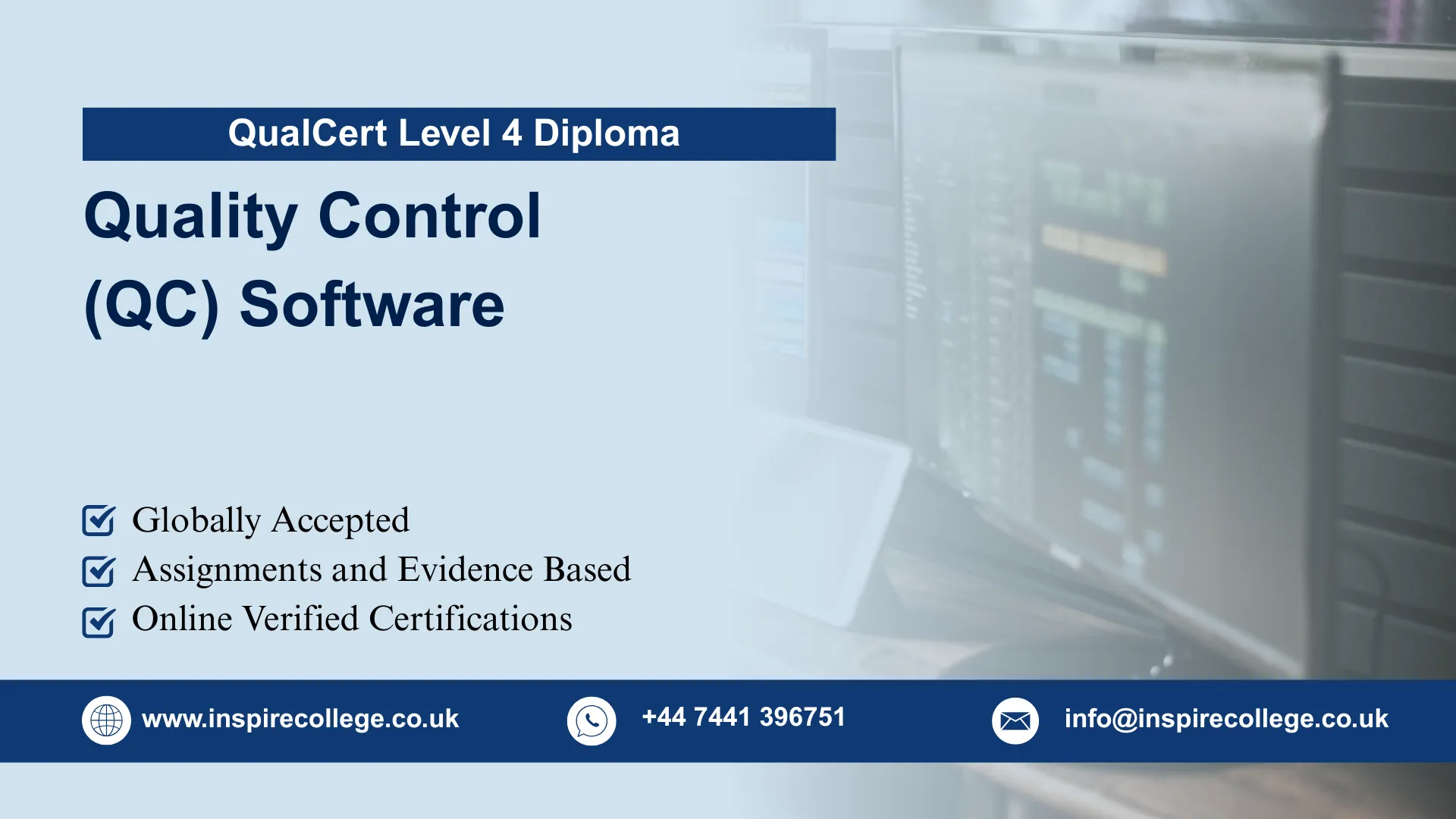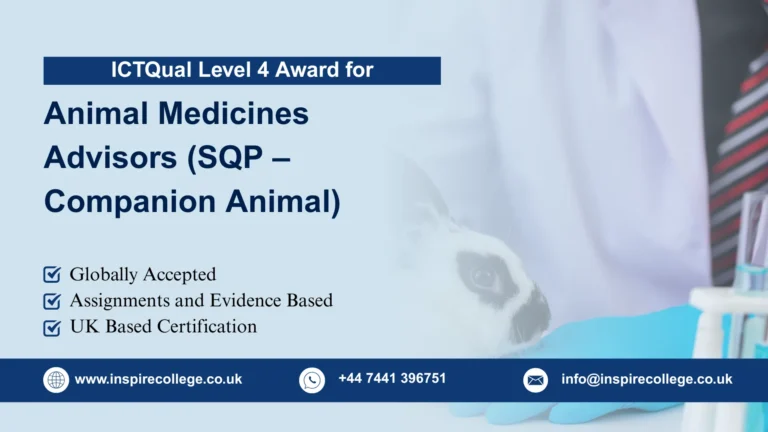
QualCert Level 4 Diploma in Quality Control (QC) Software
In the ever-evolving world of technology, ensuring software quality is a critical factor in delivering reliable, secure, and high-performing digital solutions. Organizations across industries depend on strong quality control systems to minimize risks, enhance customer satisfaction, and meet international compliance standards. The QualCert Level 4 Diploma in Quality Control (QC) Software provides learners with the essential knowledge and applied skills needed to excel in this vital area of software development.
QualCert Level 4 Diploma in Quality Control (QC) Software introduces learners to the core principles of software quality assurance, defect detection, and test management. It explores a wide range of practical methodologies, from manual testing to automated quality control techniques, enabling participants to understand how quality frameworks directly impact project success. Learners will also develop skills in risk management, compliance monitoring, and process optimization—competencies that are highly valued in today’s competitive IT and software industries.
The QualCert Level 4 Diploma in QC Software is particularly suitable for individuals beginning their career in software testing and quality assurance, as well as professionals seeking to formalize or enhance their existing knowledge. By combining theoretical understanding with hands-on learning, the QualCert Level 4 Diploma in Quality Control (QC) Software ensures that graduates are prepared to apply effective quality control practices in real-world projects.
Upon completion, learners will be equipped with a solid foundation to pursue roles in software quality control, assurance, or testing. They will also be well-positioned to progress to advanced qualifications, such as the Level 5 Diploma, expanding their professional expertise and career opportunities in the growing field of software quality management.
To ensure that learners can successfully engage with the course content and gain maximum benefit from their studies, candidates are expected to meet the following prerequisites:
- Educational Background
- Applicants should ideally have a foundational knowledge of software development or related areas.
- A background in Computer Science, Information Technology, or Software Engineering is preferred, as it provides an advantage in understanding the technical aspects of the course.
- Individuals with alternative but relevant educational qualifications, certifications, or equivalent professional experience will also be considered.
- Professional Experience
- There are no strict requirements for prior work experience; however, candidates with some exposure to software development, quality assurance, or related IT roles will find the course more accessible.
- Familiarity with using software testing tools and methodologies is beneficial, though not compulsory.
- Practical industry exposure can help learners connect theory with real-world applications more effectively.
- Technical Skills
- A basic understanding of software testing principles and awareness of the software development life cycle (SDLC) is advantageous.
- Candidates should possess fundamental computer literacy, including the ability to work with common software applications and digital tools.
- Comfort with problem-solving, logical thinking, and the use of technology will enhance the learning experience.
- Language Proficiency
- As the course is delivered entirely in English, candidates must demonstrate proficiency in reading, writing, and communication.
- Non-native speakers may be required to provide evidence of their English language ability through recognized qualifications or language assessments.
- Strong language skills are vital for understanding technical concepts, engaging in discussions, and completing written assessments.
- Commitment and Motivation
- Due to the comprehensive nature of the program, applicants are expected to show a strong commitment to their learning journey.
- A genuine interest in software quality control and a proactive approach to skill development will help candidates succeed.
- Learners should be motivated to apply their knowledge to practical contexts and continuously improve their professional capabilities.
Mandatory Units
The QualCert Level 4 Diploma in Quality Control (QC) Software comprises several study units designed to provide learners with a comprehensive understanding of QC principles and practices in the software sector. Below is the qualification structure, including the Total Qualification Time (TQT) 450, Guided Learning Hours (GLH) 270, and 72 Credits associated with the program.
- Enterprise-Level QC Management
- Six Sigma and Lean Principles in QC Software
- Advanced Statistical Process Control
- Digital Transformation and QC Automation
- Risk-Based QC Decision Making
- Leadership in Quality Control Systems
The QualCert Diploma in Quality Control (QC) Software equips learners with advanced knowledge and practical skills to manage, optimize, and lead quality assurance initiatives in modern software environments. As technology-driven organizations expand globally, ensuring reliable, efficient, and high-quality software has become a strategic priority.
Enterprise-Level QC Management
- Understand the principles and challenges of implementing quality control across enterprise-level software systems.
- Develop strategies for integrating QC processes into large-scale, multi-team, and cross-department software development environments.
- Apply industry best practices to maintain consistency, reliability, and compliance in software quality across diverse projects.
- Analyze enterprise-wide quality metrics to identify trends, evaluate performance, and drive continuous improvement initiatives.
- Evaluate compliance with international software quality standards and regulatory requirements to ensure organizational accountability.
Six Sigma and Lean Principles in QC Software
- Apply Six Sigma methodologies to enhance software quality, minimize defects, and improve process efficiency.
- Utilize Lean principles to eliminate waste, streamline workflows, and optimize quality control operations.
- Conduct root cause analysis and implement corrective measures to resolve recurring quality issues.
- Measure and optimize process performance using DMAIC (Define, Measure, Analyze, Improve, Control) frameworks.
- Integrate Six Sigma and Lean tools into software development and testing workflows for measurable quality improvements.
Advanced Statistical Process Control
- Apply statistical process control (SPC) techniques to monitor, regulate, and improve software quality outcomes.
- Use control charts to identify process variation, trends, and potential quality issues.
- Employ probability and statistical models to predict software reliability, defect likelihood, and performance outcomes.
- Utilize data-driven decision-making strategies to strengthen software testing and quality assurance practices.
- Assess software process capability and align outcomes with recognized quality benchmarks and standards.
Digital Transformation and QC Automation
- Understand the impact of digital transformation on modern software quality control processes.
- Implement advanced automation tools for software testing, defect tracking, and quality assurance management.
- Evaluate the role of artificial intelligence (AI) and machine learning (ML) in optimizing quality control and testing workflows.
- Design and develop automated workflows to enhance testing efficiency, scalability, and accuracy.
- Adapt quality control strategies to emerging technologies and digital innovation trends in the software industry.
Risk-Based QC Decision Making
- Identify potential risks associated with software quality, system performance, and project delivery.
- Apply risk management frameworks to quality control planning and decision-making.
- Prioritize testing and quality assurance activities based on structured risk assessments and impact evaluations.
- Develop proactive strategies to mitigate defects, failures, and compliance risks throughout the software lifecycle.
- Ensure adherence to regulatory requirements by integrating proactive risk management practices into QC operations.
Leadership in Quality Control Systems
- Develop leadership and managerial skills to effectively guide quality control teams and initiatives.
- Foster a culture of accountability, collaboration, and continuous improvement in software quality assurance environments.
- Implement effective communication and coordination strategies to align QC goals with organizational objectives.
- Drive organizational change, innovation, and process improvement in software quality management.
- Use performance metrics and data insights to evaluate QC effectiveness and strengthen long-term outcomes.
The QualCert Level 4 Diploma in Quality Control (QC) Software is tailored for a diverse group of learners and professionals who wish to strengthen their skills, broaden their expertise, and progress in the field of software quality management. This course is ideal for:
- Quality Assurance (QA) Professionals
- Individuals already working in QA who want to deepen their expertise in advanced quality control practices.
- Gain practical knowledge in areas such as defect management, testing methodologies, and quality frameworks.
- Enhance your ability to ensure software reliability, compliance, and continuous improvement within organizations.
- Software Testers
- Professionals seeking to advance their careers by mastering advanced testing techniques, including automated and performance testing.
- Learn how to design, implement, and analyze test cases to achieve higher accuracy and efficiency.
- Build the skills needed to progress into senior testing positions or specialized QA roles.
- Software Developers
- Developers who want to integrate quality control practices into their coding processes to deliver better-performing software.
- Gain insights into how testing and QA frameworks can strengthen code quality, reduce bugs, and improve user experience.
- Develop the dual capability of contributing to both development and quality assurance initiatives.
- IT Managers and Team Leaders
- Professionals in supervisory or leadership roles who oversee software development teams.
- Learn strategies to embed quality control processes across projects and manage team performance.
- Strengthen your ability to ensure compliance with organizational quality standards and client expectations.
- Project Managers
- Project leaders responsible for software delivery timelines and outcomes.
- Understand how to integrate QC practices into project workflows to minimize risks, reduce rework, and deliver higher-quality outputs.
- Gain practical tools for balancing project constraints while maintaining rigorous quality standards.
- Quality Control Specialists (Non-Software Backgrounds)
- Individuals with experience in quality control from other industries who want to transition into software quality management.
- Learn how to adapt your existing QC expertise to software-specific processes, tools, and standards.
- Broaden your professional scope by moving into the growing domain of software quality control.
- Career Changers
- Professionals from unrelated fields who are motivated to build a new career in software quality assurance.
- Receive a structured, comprehensive qualification to gain the foundational and practical knowledge required for this field.
- Build confidence to enter the IT industry with recognized skills in quality control.
- IT Consultants
- Consultants providing advisory services in IT and software projects who need to stay updated with advanced QC tools and practices.
- Learn how to deliver higher-value consulting solutions by incorporating the latest software quality control methodologies.
- Enhance your credibility and effectiveness when guiding clients on software quality strategies.
Register Now
QualCert Level 4 Diploma in Quality Control (QC) Software






